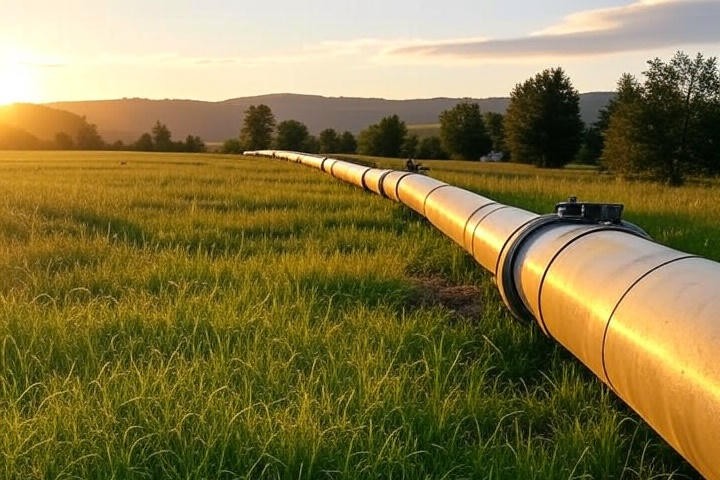· Brian Horton · Project news · 5 min read
North Dakota Approves $500 Million Backing for WBI Energy’s Bakken East Pipeline
North Dakota has approved a $500 million financial guarantee to support WBI Energy’s Bakken East Pipeline, a 375-mile natural gas project aimed at connecting the Bakken production region to underserved areas in the east. With service expected by 2030, the pipeline is set to boost energy reliability, reduce flaring, and strengthen the state’s industrial growth.

North Dakota is taking a bold step to modernize its energy infrastructure with the approval of a $500 million financial guarantee to support the construction of WBI Energy’s proposed Bakken East Pipeline. The decision, made by the North Dakota Industrial Commission in August 2025, clears a major hurdle for the multibillion-dollar natural gas pipeline, which is set to run 375 miles from McKenzie County in the west to Mapleton in the east.
The Bakken East project, developed by WBI Energy Transmission Inc., a subsidiary of MDU Resources Group, is expected to carry up to 1 billion cubic feet per day of natural gas. The pipeline aims to address the growing need for gas takeaway capacity in the Bakken region while supplying underserved areas of central and eastern North Dakota. The initiative represents a strategic shift in how the state manages its natural resources, aiming to turn flared or stranded gas into a valuable energy supply for power generation, industry, and residential customers.
Currently, much of eastern North Dakota depends on the Viking Gas Transmission pipeline, which originates in Canada. The Bakken East project would significantly enhance energy security and reliability for this region, giving communities access to locally produced natural gas for the first time. Governor Kelly Armstrong described the project as a transformative investment, noting that it enables the state to “move a product we have in excess to people who need it.”
Construction of the pipeline is planned in two phases. The first phase will extend from McKenzie County to the Washburn area, with a target in-service date of November 2029. The second phase will connect Washburn to Mapleton, near Fargo, and is scheduled for completion by November 2030. WBI is also exploring a potential extension to Ellendale in southeastern North Dakota to provide service to the southeastern corner of the state.
The state’s financial support does not involve direct ownership of the pipeline. Instead, the Industrial Commission has agreed to act as an “anchor shipper,” purchasing firm transportation capacity on the pipeline that can later be transferred to private-sector users. This structure allows the state to backstop the project while minimizing long-term financial risk. If capacity cannot be resold, the state could be responsible for annual payments of up to $50 million over ten years, a cost that would be covered by the Strategic Investment and Improvements Fund. Funding would be facilitated through the Bank of North Dakota.
State officials and industry experts argue the project is critical to maintaining and growing oil production in the Bakken, especially as wells mature and produce more natural gas. Without additional takeaway capacity, operators face increased flaring restrictions and production limitations. The Bakken East Pipeline would also support industrial development in energy-starved eastern North Dakota, where new manufacturing and agricultural processing facilities require consistent, reliable access to natural gas.
The North Dakota Pipeline Authority estimates the total capital expenditure for the pipeline will range from $1.2 billion to $1.6 billion. WBI Energy has already begun surveying work and reports that over 80 percent of affected landowners have granted access. Easement negotiations are expected to begin once the final route is confirmed, with eminent domain considered a last resort.
WBI’s proposal was chosen over a competing project from Intensity Infrastructure Partners, a venture backed by Rainbow Energy. While both projects aimed to connect western gas supplies to the east, WBI’s commitment to build both phases of the pipeline was a decisive factor. The company also has a long-standing presence in the region, currently transporting around 60 percent of all natural gas produced in the Bakken.
Regulatory oversight of the Bakken East Pipeline will fall under the Federal Energy Regulatory Commission (FERC), as the pipeline will be classified as an interstate project. This means it is not subject to state-level siting approval by the North Dakota Public Service Commission. While this streamlines the permitting process, WBI must still adhere to strict federal environmental and safety regulations.
Industry leaders view the state’s backing as a significant vote of confidence. Rob Johnson, president of WBI Energy, emphasized that the financial guarantee acts as a bridge to help the project move forward while market demand solidifies. The company recently launched a non-binding open season to gauge interest from potential shippers and plans to refine its final design based on responses.
The Bakken East Pipeline represents more than just a midstream expansion—it is a strategic investment in the long-term sustainability of North Dakota’s energy economy. By unlocking stranded natural gas resources and delivering them to areas of need, the state is positioning itself for stronger industrial growth, lower emissions, and greater energy independence.
With financial commitments in place and design work advancing, the Bakken East Pipeline is set to become one of the most impactful infrastructure projects in North Dakota’s energy history. The coming months will be critical as WBI Energy finalizes its agreements with the state and moves toward regulatory approval and construction mobilization.
- Natural Gas
- Pipeline Infrastructure
- North Dakota Energy